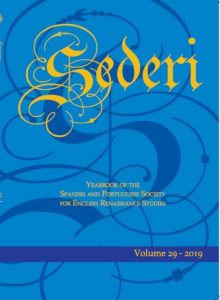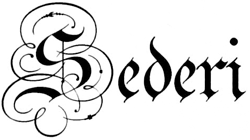
Sederi 29
Sederi 29 — 2019
EDITOR
Ana Sáez-Hidalgo
MANAGING EDITOR
Keith Gregor
REVIEW EDITOR
María José Mora
ISSN 1135-7789
Manel Bellmunt-Serrano, “Leskov’s rewriting of Lady Macbeth and the processes of adaptation and appropriation.” SEDERI 29 (2019): 11–33.
DOI: https://doi.org/10.34136/sederi.2019.1 Download PDF
Abstract
This article tries to provide a thorough analysis of Nikolai Leskov’s rewriting of Lady Macbeth, the Shakespearean character, in the novella Lady Macbeth of the Mtsensk District, from the perspective of Translation and Adaptation Studies. The focus will be placed on the ideology of the author who, with full knowledge, rewrites a previous work to adapt it to a specific context. Apart from Leskov’s work, attention will be also paid to two of its subsequent adaptations: Dmitri Shostakovich’s homonymous opera and William Oldroyd’s filmic version, Lady Macbeth.
Finally, the importance of these processes for the development of target literary systems will be discussed and emphasized.
Keywords: William Shakespeare; Lady Macbeth; ideology; rewriting; Nikolai Leskov; Dmitri Shostakovich; William Oldroyd; Translation and Adaptation Studies.
References
Aizlewood, Robin. 2007. “Leskov’s Ledi Makbet Mtsenskogo uezda: Composition and Symbolic Framework.” The Slavonic and East European Review 85 (3): 401–40.
Alfar, Cristina. 1998. “Blood Will Have Blood: Power, Performance, and Lady Macbeth’s Gender Trouble.” Journal X 2 (2): 179–207.
Basnett, Susan. 2006. “Reflections on Comparative Literature in the Twenty-first Century.” Comparative Critical Studies 3 (1–2): 3–11.
Bassnett, Susan, and André Lefevere. 1990. Translation, History and Culture. New York: Pinter.
Benjamin, Walter. 2006. “The Storyteller: Reflection on the Works of Nikolai Leskov.” In The Novel: An Anthology of Criticism and Theory 1900–2000, edited by Dorothy J. Hale, 361–77. Malden, Mass.: Blackwell Publishing.
Bielsa, Esperanza. 2009. “Globalization, Political Violence and Translation: An Introduction.” In Globalization, Political Violence and Translation, edited by Esperanza Bielsa and Cristopher Hughes, 1–21. New York: Palgrave MacMillan.
Calzada Pérez, María. 2003. “Why Ideology?” In Apropos of Ideology. Translation Studies on Ideology – Ideologies in Translation Studies, edited by María Calzada Pérez, 1–22. Manchester and Northampton: St. Jerome Publishing.
Das, Pragati. 2012. “Shakespeare’s Representation of Women in his Tragedies.” Prime University Journal 6 (2): 37–56.
Emerson, Caryl. 1989. “Back to the Future: Shostakovich’s Revision of Leskov’s Lady Macbeth of Mtsensk District.” Cambridge Opera Journal 1 (1): 59–78.
Emerson, Caryl. 2011. “Shostakovich’s Lady Macbeth of Mtsensk.” In All the Same The Words Don’t Go Away, 342–61. Boston: Academic Studies Press.
Gardiner, Judith K. 1981. “Female Identity and Writing by Women.” Critical Inquiry 8 (2): 347–61.
Gentzler, Edwin. 1993. Contemporary Translation Theories. New York: Routledge.
Herman, David, Manfred Jahn, and Marie-Laure Ryan, eds. 2005. Routledge Encyclopedia of Narrative Theory. London and New York: Routledge.
Hermans, Theo. 1985. The Manipulation of Literature. Studies in Literary Translation. London and Sydney: Croom Helm.
Jaques, Thomas. 2002. “Ideological Transformation through Translation.” NUCB JLCC 4 (1): 13–19.
Kuhiwczak, Piotr, and Karin Littau. 2007. A Companion to Translation Studies. Clevedon, Buffalo, Toronto: Multilingual Matters Ltd.
Lefevere, André. 1992. Translation, Rewriting and the Manipulation of Literary Fame. London and New York: Routledge.
Leskov, Nikolai. 2014. The Enchanted Wanderer & Other Stories. London: Vintage Classics.
Lounsberry, Anne. 2005. “No, This Is Not the Provinces! Provincialism, Authenticity, and Russianness in Gogol’s Day.” The Russian Review 64 (2): 259–80.
Melick, Jennifer. 2000. “No Holding Back.” Opera News 64 (9): 32–34.
Milton, John. 2009. “Translation Studies and Adaptation Studies.” In Translation Research Projects 2, edited by Anthony Pym and Alexander Perekrestenko, 51–58. Tarragona: Intercultural Studies Group.
Mukherjee, Ankhi. 2014. What is a Classic? Postcolonial Rewriting and Invention of the Canon. Stanford, California: Stanford University Press.
Oldroyd, William, dir. 2016. Lady Macbeth. BBC Films and Creative England through iFeatures.
Sanders, Julie. 2006. Adaptation and Appropriation. London and New York: Routledge.
Schmid, Wolf. 2010. Narratology. Berlin and New York: De Gruyter.
Shakespeare, William. 1990. Macbeth. Oxford: Oxford University Press.
Shostakovich, Dimitri. 2006. Lady Macbeth of Mtsensk. Barcelona Opera. Warner Classics.
Spoto, Stephanie I. 2010. “Jacobean Witchcraft and Feminine Power.” Pacific Coast Philology 45: 53–70.
Tymoczko, Maria. 2016. “Translation: Ethics, Ideology, Action.” The Massachusets Review 47 (3): 442–61.
Van Dijk, Teun. 1998. Ideology. A Multidisciplinary Approach. London: Sage.
Venuti, Lawrence. 1995. The Translator’s Invisibility: A History of Translation. London: Routledge.
Venuti, Lawrence, ed. 2007. The Translation Studies Reader. London and New York: Routledge. 2nd ed.
Verschueren, Jef. 1999. Language and Ideology. Selected Papers from the 6th International Pragmatics Conference. Vol. 1. Antwerp: International Pragmatics Association (IprA).
Wells, Elizabeth A. 2001 “Lady Macbeth and Sexual Politics in the Stalinist Era.” Cambridge Opera Journal 13 (2): 163–89.
Weston, Kelli. 2017. “Making a Murderer.” Sight and Sound 27 (5): 34–36.
Wigzell, Faith. 1988. “Dreams Books and Lady Macbeth’s Cat.” The Slavonic and East European Review 66 (4): 625–30.
Wigzell, Faith. 1989. “Folk Stylization in Leskov’s Lady Macbeth Mtsenskogo uezda.” The Slavonic and East European Review 67 (2): 169–82.
Wigzell, Faith. 1999. “The Dreambook in Russia: Persistence and Popularity.” Workshop Journal 48: 114–32.
Willis, Holly. 1998. “Beg, Borrow, or Steal: Women and Adaptation in Contemporary Film and Video.” Pacific Coast Philology 33 (2): 118–21.
